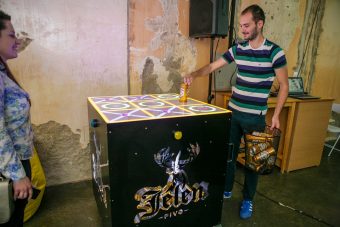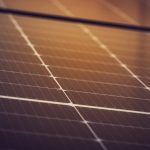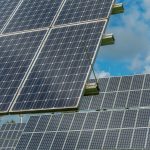Ecology and environmental conservation are known as one of the fields of science and life. However, climate change and awareness of the consequences of human activities indicate the growing need to intensify the principle of sustainability in all the fields.

Innovations are an effective mechanism for creating solutions for many challenges. Support to innovation makes it possible to meet the challenges both at local and global level, and the Innovation Fund of the Republic of Serbia (the Fund) has been doing that since 2011 in cooperation with the World Bank and the European Union.
Among many projects applying for the innovation support implemented by the Fund, there is a significant number of those coming precisely from the field of energy efficiency and environmental protection. Nine per cent of the total number of funded projects come from energy efficiency, and it is the fifth area in terms of incidence, after projects in the field of information and communication technologies, agriculture and food, machinery and mechanical engineering and software development. Environmental projects account for 3 per cent and are ranked ninth. The trend of applied and funded projects in these areas has been increasing over the years.
It is important to note that the Fund does not allocate funding based on priority or preferential areas and that there is no sectoral focus. On the other hand, an essential factor is the monitoring of the number of applications and the number of projects financed in each area, to identify trends and channel finances through future targeted calls and new programs.
The Technology Transfer Office has been operating within the Fund since 2016 and successfully cooperates with the Serbian academic society, supporting scientific innovations and scientific research. The development of several sustainable technologies has been supported through The Technology Transfer program and The Innovation Voucher program. The idea is to continue the trend through the new program – The Proof of Concept program.
Examples of Supported Projects
The new catalyst for the dehalogenation of freon comes from the Innovation Centre of the Faculty of Technology and Metallurgy in Belgrade. It aims at the more efficient elimination of freon from the environment. Freons are known to be released from cooling systems, fire guishing systems and polyurethane foams for thermal insulation, thereby damaging the ozone layer. The innovative catalyst provides 95.5 per cent efficiency.
Dr. Knight is a spin-off project (created as a by-product of the main project, editorial note), originating from the Faculty of Technology and Metallurgy in Belgrade, dealing with the production of multifunctional colour catcher laundry balls. This technology is patented, and the balls have a dual function: in addition to removing colours quickly, to prevent the transition from one fabric to another, they also serve as a fabric and water softener and can be reused. First of all, they are biodegradable and produced in an energy efficient manner.
In addition to academic society, the Fund has successfully financed the innovations of micro, small and medium sized enterprises since its inception. Solagro is one of those projects. It deals with developing a new model of smart press for can recycling. They stand out for the most technically advanced smart press mechanism that reduces waste volume by 90 per cent compared to the initial state, providing a better user experience with an attractive design in comparison to other existing mechanisms. The Fund funded this start-up through the Early Development Program for a year, after which the device was ready for use. This press has been installed in more than 150 locations in 9 countries worldwide, and the company has collaborated with more than 30 clients, including global brands Ball packaging, Coca-Cola, Molson Coors and others. Through its innovative approach and attractive packaging, Solagro achieves its goal of motivating people to recycle.
In focus:
In the cooperation with the Finnish Embassy, the Fund has organised four local competitions for Slush start-ups. Local winners had the opportunity to take part in global competition and participate in the Slush conference in Finland. The fourth competition in 2018 was the topic of sustainable innovation where more than 25 start-ups from Serbia applied, 11 of which were shortlisted. All of them have developed or are still developing solutions in the field of sustainable, green innovation, including energy efficiency and environmental protection.
By the decision of Finnish experts in Serbia, the start-up Box System was the winner of the local Slush competition in 2018. Box System designed eco-friendly food transport boxes that require specific temperature conditions called WooBox. The boxes are made of wood and wool as a natural alternative to expanded polystyrene foam. This team strives to become an important link in the circular economy chain in the global market and thus contribute to the sustainable future of our planet.
Further Development of Innovations

The question is what to do next and where to direct the focus of start-ups and new scientific research so that the field of sustainability would make sense. Numerous technologies drive innovation, but the question is, how do new technologies themselves affect sustainability? It is also one of the topics that Health Tech Lab (HTL) deals with and will continue dealing with. HTL enables the formation and development of innovations in the health technology ecosystem as well as the digitization of healthcare in a sustainable way. It cooperates with start-ups such as AlgiOx – a start-up that has created a smart indoor air purification system to prevent a number of health issues, and the system also produces oxygen. The Energy Portal also wrote about HTL’s work related to sustainability.
Digitization is one of the priorities for all governments as it contributes to the quality of life through economic growth, productivity gains and employment rates. However, data centres also contribute significantly to emissions due to high energy consumption and often inappropriate cooling systems, consuming up to 2 per cent of global electricity, with a growth rate of 12 per cent annually. Additionally, the typical life span of a device is about 2 to 3 years, and there is intense energy consumption to design, assemble, pack and deliver these devices to consumers worldwide. It all affects the increase of e-waste, including all household appliances.
When the electronics are not recycled appropriately, the raw materials in them release toxic chemicals into the ground and therefore into our food. Compared to conventional municipal waste, certain components of electrical products contain toxic substances that can create threats to the environment as well as to human health (increased risk of cancer and neurologic disease). For examples, television and computer monitors typically contain hazardous materials such as lead, mercury and cadmium, while nickel, beryllium and zinc are often present in switchboards.
Ivana Kostic
Read the whole article in the new issue of Energy portal Magazine GRINNOVATIONS, December 2019 – February 2020.





